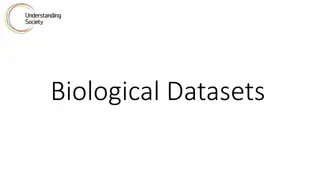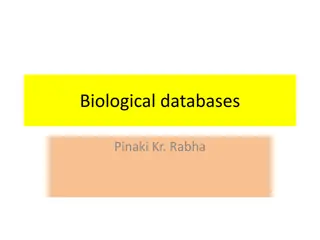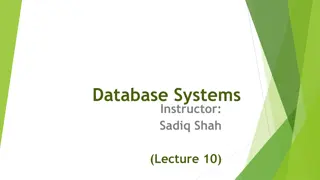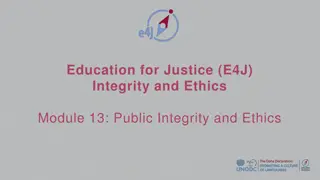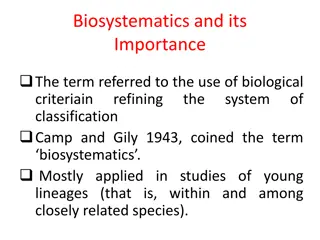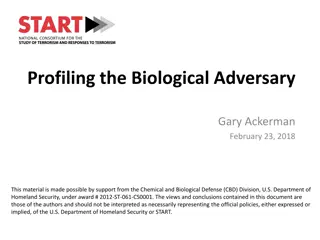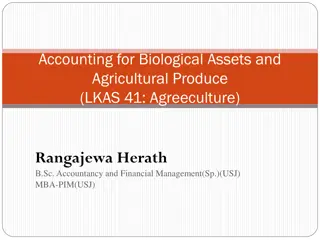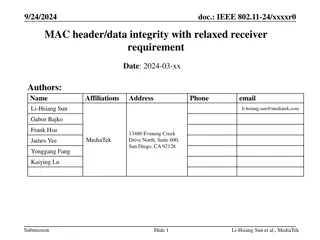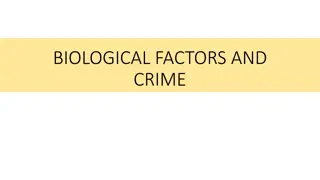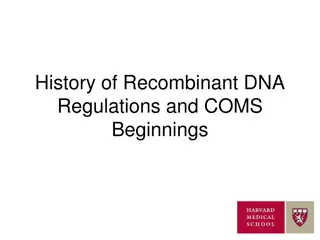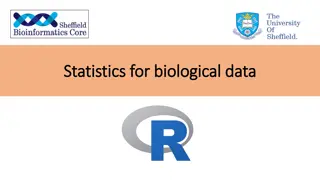INTEGRITY: A FACTOR FOR EQUALITY THROUGH INCLUSIVE POLICIES
In a global context of growing income inequality, the importance of integrity in fostering equality through inclusive policies is emphasized. The OECD works with Mexico to address issues of inequality, corruption, and declining trust in government, highlighting the need for integrity and competence
0 views • 17 slides
Explore Agricultural and Biological Engineering (ABE) Programs at Purdue University
Discover the academic programs and valuable resources offered by the Agricultural and Biological Engineering (ABE) department at Purdue University. Meet the dedicated staff members, review degree options, and learn about upcoming events and registration processes. Explore opportunities in fields suc
2 views • 16 slides
Understanding Diverse Classes of Lipids in Biological Systems
Sphingolipids and waxes are important classes of lipids found in biological membranes, each with unique structures and functions. Sphingolipids, including sphingomyelins and glycosphingolipids, play crucial roles in nerve transmission, cell recognition, and tissue immunity. Waxes, on the other hand,
3 views • 4 slides
Biological Hazards in the Hospital Community
Healthcare workers face various occupational hazards, including biological risks, in hospital settings. This article by Ephraim E. Ibadin explores the definition, types, risk factors, sources, prevention, and control of biological hazards in hospitals, emphasizing the importance of protecting worker
0 views • 30 slides
Understanding Cryptographic Data Integrity Algorithms
Cryptographic data integrity algorithms ensure data integrity, verifying data received matches what was sent by authorized entities. Cryptographic hash functions play a crucial role in ensuring data integrity through hash values. Applications include message authentication, digital signatures, and v
3 views • 41 slides
Understanding Academic Integrity at the University of Manitoba
Explore the essential aspects of academic integrity, including its definition, importance for students, types of dishonesty, and expectations in a class setting. Discover why students should care about academic integrity, the various types of academic misconduct such as plagiarism and cheating, and
0 views • 28 slides
Understanding Biological Datasets and Omics Approaches in Disease Research
Explore the world of biological datasets, lipidomics, genomics, epigenomics, proteomics, and the application of omics in studying biological mechanisms, predicting outcomes, and identifying important variables. Dive into DNA, gene expression, methylation, and genetic datasets to unravel the complexi
0 views • 34 slides
Overview of Lipids: Classification and Biological Importance
Lipids are organic substances that play a crucial role in biological systems. They include simple lipids, complex lipids like phospholipids and glycolipids, and derived lipids. Simple lipids are esters of fatty acids with various alcohols, while complex lipids are sub-classified based on the type of
2 views • 38 slides
Understanding Integrity at Ok Tedi: Values and Practices
Ok Tedi's commitment to integrity is reflected in their values and operational practices. The organization emphasizes honesty, good moral principles, and accountability in all aspects of their work. Integrity is demonstrated through speaking the truth, maintaining safety, accurate reporting, and tre
0 views • 6 slides
An Overview of Biological Databases in Bioinformatics
Biological databases play a crucial role in bioinformatics, storing vast amounts of data related to nucleotide sequences, protein sequences, and more. These databases are publicly accessible and essential for research in biological fields. Primary databases, such as GenBank, EMBL, and DDBJ, contain
0 views • 13 slides
Understanding Biosafety and Biosecurity Principles
Biosafety and Biosecurity are essential concepts in safeguarding against biological hazards. This article explores the definitions of hazard, threat, and risk, emphasizing the importance of managing risks associated with biological materials through biosafety and biosecurity measures. Learn about th
0 views • 26 slides
Understanding Integrity Constraints in Relational Database Systems
Integrity constraints play a crucial role in maintaining the accuracy and integrity of data in a database. They include domain constraints, entity integrity, and referential integrity, each serving a specific purpose to ensure data consistency and reliability. Domain constraints ensure values in a c
0 views • 12 slides
Understanding Chemical Groups and Macromolecules in Biological Processes
In biological processes, certain chemical groups play crucial roles in molecular functions. These functional groups, including hydroxyl, carbonyl, carboxyl, amino, sulfhydryl, phosphate, and methyl, are essential for the structure and function of biological molecules. Additionally, macromolecules, s
0 views • 9 slides
Exploring Public Integrity and Ethics in Civil Service
This module on public integrity and ethics delves into key instruments for strengthening ethical practices in public organizations, challenges faced, analyzing codes of ethics, and managing integrity risks. The agenda includes activities like structured ethical reflection, understanding public value
1 views • 13 slides
Understanding Integrity: A Biblical Perspective
Explore the concept of integrity through the lens of biblical teachings, focusing on examples from the story of Solomon and David. Discover the meaning of integrity in Hebrew and how it relates to being complete, whole, and consistent in actions and words. Learn about subconscious ways integrity can
0 views • 17 slides
Trickling Filter: A Sustainable Wastewater Treatment Solution
The trickling filter is a biological treatment process utilizing a solid media where bacteria accumulate to maintain high populations. Bacteria growth occurs on the media surface with oxygen provided by air diffusion. As bacteria metabolize waste, they reproduce, creating a biological layer. Filter
5 views • 26 slides
The Significance of Integrity and Honesty in Personal Skills
Understanding the meaning of integrity and how it relates to honesty is crucial for individuals to live ethically. This article delves into the importance of honesty and integrity, evaluating one's own level of honesty, and practical scenarios showcasing integrity in action.
0 views • 16 slides
Understanding Biosystematics and Its Significance in Biological Classification
Biosystematics plays a crucial role in refining biological classification by focusing on biological criteria to define relationships within closely related species. It helps delineate biotic communities, recognize different biosystematic categories, and understand evolutionary patterns. Through the
0 views • 15 slides
Understanding Biological Adversaries: Education Levels and Demographics
Exploring the traits of biological adversaries, this study reveals that perpetrators with higher education levels are more likely to successfully use chemical and biological agents. Success tends to increase with age and years of activity. Most individual perpetrators originate from the MENA region,
0 views • 16 slides
Academic Integrity Policy at UIS - Guidelines and Procedures
The Academic Integrity Council at UIS ensures fair operation of hearing panels, reviews the policy implementation, and educates the community. It aims to protect the integrity of the academic environment and helps students develop integrity. Enforcement and effectiveness rely on faculty and departme
0 views • 14 slides
Accounting for Biological Assets and Agricultural Produce
At the end of this lesson, you will be able to identify the principal issues in accounting for biological assets and agricultural produce at the time of harvest. Topics include the recognition, measurement, presentation, and disclosure of biological assets in financial statements. Questions regardin
0 views • 26 slides
Accounting for Biological Assets and Agricultural Produce (LKAS 41: Agriculture) by Rangajewa Herath
This content provides insights into the accounting standards for biological assets and agricultural produce under LKAS 41, discussing classification, presentation, measurement, gain or loss recognition, and disclosure requirements. It covers the unique nature of biological assets, the scope of LKAS
0 views • 20 slides
Understanding Workplace Safety Hazards: Physical, Chemical, and Biological Risks
Explore the three main types of workplace safety hazards - physical, chemical, and biological - with a focus on identifying potential risks and ensuring a safe work environment. Learn about common hazards such as repetitive motion, chemical exposure, and handling biological materials, essential for
0 views • 97 slides
Academic Integrity Board Game Overview
Academic Integrity Board Game offers a fun and educational approach to understanding academic integrity. The game revolves around values like honesty, trust, fairness, respect, responsibility, and courage, as defined by the International Center for Academic Integrity. Players set up the board, place
0 views • 4 slides
Reexamining the Biological Race Debate by Quayshawn Spencer
Quayshawn Spencer reexamines the biological race debate, discussing the onto-semantic strategy, its problems, and applications to public health genomics. The philosophical foundations of biological racial anti-realism are critiqued, exploring the concept of race through historical perspectives like
0 views • 37 slides
Understanding Durability and Integrity in Data Storage Systems
Durability and integrity are crucial aspects of data storage systems. Durability ensures data survives faults like crashes and power loss, while integrity ensures data correctness in the face of faults. Disk data is durable due to surviving power loss, and has integrity through explicit and complex
0 views • 24 slides
Biology Integration Institutes (BII) - NSF Research Opportunity
Supporting collaborative teams of researchers exploring overarching biological themes, the Biology Integration Institutes (BII) provide a framework for integrated research in diverse biological disciplines. This initiative enables design and development activities, with potential for significant fun
0 views • 10 slides
Exploring the Concept of Integrity through Art and Quotes
Delve into the multifaceted theme of integrity through thought-provoking quotes, artistic interpretations, and personal reflections. Witness how individuals from diverse backgrounds define and exemplify integrity in their own lives. Join the journey to understand the significance of integrity and it
0 views • 8 slides
Enhancing Data Integrity in IEEE 802.11 Networks
This document discusses proposals for improving data integrity in IEEE 802.11 networks, specifically focusing on header protection for individually addressed data and management frames. It explores the challenges and alternatives related to verifying Message Integrity Check (MIC) before sending ackn
0 views • 20 slides
Guide to UCSB Biological Safety Program
This guide provides an overview of UCSB's Biological Safety Program, covering important aspects such as lab safety fundamentals, biological use authorization, biosafety officer's role, and the Institutional Biosafety Committee. It outlines key steps like hazard assessment, training, waste management
0 views • 24 slides
Enzymes in Biological Reactions: Understanding Activation Energy
Enzymes, as biological catalysts, play a crucial role in regulating biological processes by lowering the activation energy required for chemical reactions in cells. The addition of enzymes changes the overall energy dynamics of reactions, impacting the rate at which products are formed. This interac
0 views • 7 slides
Supervisor's Role in Guiding Students in Citizen Science and Business Projects
This module focuses on the critical role supervisors play in guiding students engaged in citizen science and business projects. It covers topics such as ethical challenges, academic integrity, and educational materials to support students and supervisors in their collaboration. The training plan inc
0 views • 6 slides
Analytical Toxicology: Techniques and Sample Analysis in Clinical Toxicology
Analytical toxicology involves the observation, identification, and measurement of foreign compounds in biological and other samples, such as urine, blood, stomach contents, nails, hair, and DNA. Various techniques are used to isolate and identify drugs and poisons present in these samples. This fie
0 views • 12 slides
Understanding Biological Factors and Crime: Genetics, Neurotransmitters, Neuro-biology
Biological factors such as genetics, neurotransmitters, and neuro-biology play significant roles in influencing criminal behavior. Genetics can predispose individuals to antisocial behavior, neurotransmitters like serotonin and norepinephrine impact social behavior, and neuro-biological damage can l
0 views • 13 slides
Understanding Biological Hazards in the Workplace: A Comprehensive Overview
This chapter delves into the realm of biological hazards in occupational settings, shedding light on the risks posed by microorganisms, arthropods, allergens, toxins, and more. It highlights the diverse range of biological agents that can lead to infections, allergies, toxic reactions, and even seri
0 views • 45 slides
Advancing Biological Data Standards for Marine Research
Discussion on biological data standards for marine research, challenges faced, existing standards, and the need for guidance and community building. Goals include maximizing data relevance for biodiversity studies. Ongoing work involves developing a primer for data managers unfamiliar with biologica
0 views • 7 slides
Medicaid Integrity Institute 2012 Training Conference Overview
The Medicaid Integrity Institute (MII) provides training and technical assistance to state Medicaid program integrity employees at no cost. The institute, established in 2007 by CMS and the US Dept. of Justice, aims to enhance national program integrity standards. Located at the National Advocacy Ce
0 views • 8 slides
Understanding COMS and Recombinant DNA Regulations
The Committee on Microbiological Safety (COMS) was established in 1978 to address public concerns regarding safety, environment, and ethics of research involving hazardous biological agents. COMS oversees activities related to recombinant DNA and biological agents at Harvard, supporting all schools
0 views • 6 slides
Understanding Statistics for Biological Data in Courses
Dive into the world of statistics for biological data through a comprehensive course led by experienced instructors at the University of Sheffield. Explore the fundamentals of statistics, research questions, hypotheses, and hypothesis testing related to biological inquiries. Gain insights into organ
0 views • 14 slides
Practice Test for Developing Integrity in 4th Grade
This practice test by Renee Cook from Brownsburg, IN, focuses on developing integrity in 4th-grade students. The test includes scenarios where students have to choose the best action reflecting integrity. The test is designed like a dartboard, aiming to find the "bull's-eye" answer that aligns most
0 views • 18 slides






